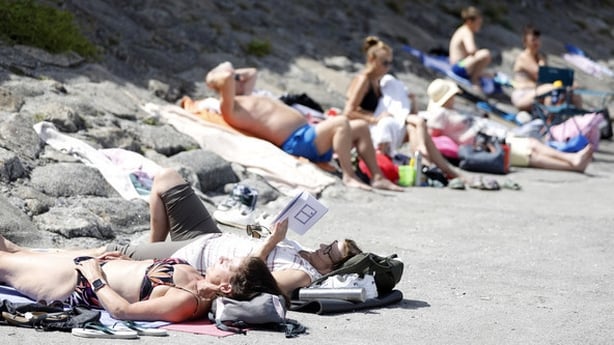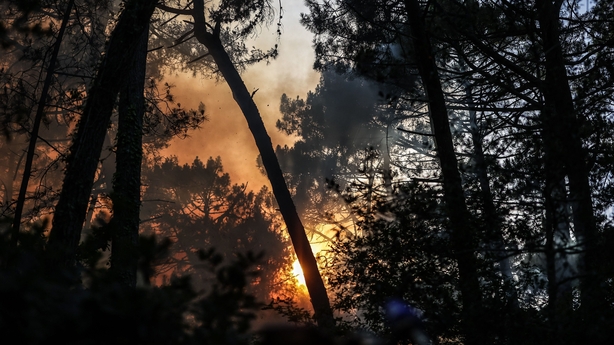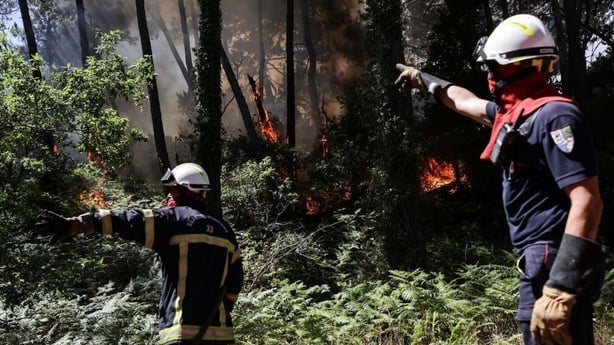A heatwave sweeping southwestern Europe was expected to peak on Thursday in Spain, with the scorching temperatures fuelling stubborn wildfires ravaged several countries.
Temperatures soared in Greece, Spain and Portugal, while the heatwave was expected to continue in Britain and France into next week.
It is the second heatwave to hit the region in a matter of weeks, as scientists say they are becoming more frequent and intense due to climate change.
Southern Spain was bracing for temperatures to rise again Thursday as the stifling heat continued.
"For Thursday, we expect it to be the hottest day of this heatwave," said Spain's state meteorological agency AEMET.
The valleys around three major rivers - the Guadiana, Guadalquivir and Tagus - will experience temperatures of 44 Celsius to 45 Celsius, it said.
The health ministry told people to drink plenty of fluids, wear light clothes and stay in the shade or air-conditioning.
The city of Almonte in the southern region of Andalusia saw the mercury hit 45.6 degrees Celsius at 5.30 pm on Wednesday.
Several other southern cities such as Seville and Cordoba recorded temperatures above 44C.
'Major' fires
A fire in Spain which started in the eastern region of Extremadura on Monday has so far ravaged at least 4,000 hectares of land, local officials said.
Between 1 January 1 and 3 July, more than 70,300 hectares of forest went up in smoke in Spain, the government said - almost double the average of the past 10 years.
Italy, Croatia, France and Portugal all reported forest fires linked to the heat this week.
In Greece, a helicopter helping to fight a forest fire on the island of Samos on Wednesday crashed into the Aegean Sea, killing two crew members, the coastguard said on Thursday.
In Portugal, over 2,000 firefighters were battling dozens of wildfires across Portugal, including four deemed "major".
One person died in a forest blaze, authorities said Wednesday, after a body was found in a burned area in the northern region of Aveiro.
Around 60 others have been injured, some 860 people evacuated and roughly 60 homes destroyed or damaged.
Portuguese Prime Minister Antonio Costa warned that Thursday would be the "most serious" day of the heat wave because temperatures were expected to rise and winds were stronger.
"Today is the day where we have to be the most careful," he said.

Fireworks cancelled
Meteorological services in France also warned the situation would "become intense between Sunday and Tuesday" - possibly exceeding 40C before dipping by Wednesday.
Although temperatures eased by a few degrees Celsius across France, wildfires continued in the Gironde region near the southwestern city of Bordeaux, destroying some 3,700 hectares of forest in three days, with firefighters still unable Thursday to stop the blazes.
Tourist magnet the Dune de Pilat, Europe's highest sand dune, was closed to visitors after several thousands were evacuated from campsites this week.
"The situation is stable, but not yet under control," the region's authorities said Thursday as temperatures were forecast to hit 38C.
However, no additional evacuation of residents was planned, after hundreds were moved from their homes in recent days as a precaution in the region.
Further south, the Landes region and the city of Nimes cancelled all fireworks for Bastille Day, France's national holiday.
Temperatures were expected to reach 36C in southern France, 25C in the north of the country, and 32C in Paris on Thursday.
The forecaster said that daytime temperatures will widely reach the high twenties, possibly exceeding 30C in some locations. It added that temperatures will remain uncomfortably warm overnight too.
Dr Diarmuid Quinlan, Medical Director at the Irish College of General Practicioners, said there are several risks associated with hot weather that people should be aware of, including the long-term risk of skin cancer.
Speaking on RTÉ's Morning Ireland, Dr Quinlan said it is important for people to realise that cloud cover does not prevent UV damage and he advised people to apply sunscreen carefully.
He said cool showers, painkillers and avoiding further sun exposure are the best methods for relieving sunburn.
He warned that exhaustion can cause people to feel unwell and light-headed. These are common symptoms of dehydration, he said, adding that people should drink lots of water and seek shaded areas.

Britain has issued an "amber" alert - the second highest of three levels - while one UK climate official said there was a chance Britain's highest temperature, the 38.7C recorded on 25 July, 2019 at Cambridge Botanic Garden, could be surpassed.
Meteorological services in France also warned the situation would "become intense between Sunday and Tuesday" - possibly exceeding 40C before dipping by Wednesday.
A wildfire in southwestern France has raged since Tuesday, ripping through 1,000 hectares (2,500 acres) of pine trees just south of Bordeaux and forcing the evacuation of 150 people from their homes.
Near the Dune of Pilat - Europe's tallest sand dune - another fire consumed about 700 hectares of old pine trees, officials there said, resulting in the evacuation of about 6,000 campers near the dune.
Further inland, 500 people were evacuated around the French village of Guillos as their homes came under threat from advancing fire.
"There were flames at the top of the trees 30 metres high," mayor Mylene Doreau told AFP.
"We could see them moving towards the village, it was scary."

Some 600 firefighters have been battling the blazes in the region, aided by waterbomber aircraft.
To limit the risk of accidental fire, some cities - including Toulouse and Lourdes - made changes to their Bastille Day celebrations on Thursday. Nimes simply cancelled the traditional fireworks altogether.
Spectators at the annual Tour de France, which is currently crossing the French Alps, watched the riders tackle some of the bike race's toughest climbs in the blazing sunshine yesterday.
"They really feel the heat. I'm just standing here watching," French student Jean Gosselin, 18, said sympathetically.
Heatwaves have become more frequent due to climate change, scientists say, the previous ones in France, Portugal and Spain having taken place only last month.

Last week, an avalanche triggered by the collapse of the largest glacier in the Italian Alps - due to unusually warm temperatures - killed 11 people.
In Greece, a helicopter helping to fight a forest blaze on the island of Samos yesterday crashed into the Aegean Sea, the coastguard said. Two crew members were seriously injured.
And in Portugal - on alert for wildfires for days - one person had died in a forest blaze, authorities said, after a body was found in a burned area in the northern region of Aveiro.
Around 60 others have been injured, over 700 people evacuated and nearly 30 homes destroyed or damaged.
Over 2,000 firefighters were battling four major fires in Portugal this morning.
Portuguese Prime Minister Antonio Costa warned that today would be the "most serious" day of the heat wave because temperatures were expected to rise and winds were stronger.
"Today is the day where we have to be the most careful," he said.
At Leiria, central Portugal, locals fought to save their village as fires closed in on them.
"Everything burned yesterday except the houses, because the people are very brave and defended them themselves," said 77-year-old farmer Adelino Rodrigues.
It brought back memories of the devastating wildfires in 2017, which claimed the lives of more than 100 people in Portugal.
"It looked like the end of the world," he recalled.


